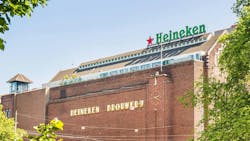Heineken Partners with Siemens to Decarbonize Brewing Production Sites Across the Globe
Heineken, an international brewing company, is partnering with Siemens to achieve its long-term decarbonization program as part of the company’s ambitions to reach net zero in Scope 1 and 2 emissions across all production sites by 2030.
Siemens will implement solutions and services from its Siemens Xcelerator portfolio to reduce the overall energy usage at more than 15 Heineken beer and malt production sites across Asia-Pacific, the Americas, and Europe.
“As we continue to focus on the delivery of our journey to reach net zero in Scope 1 and 2, we know that we must make many bold and ambitious moves to decarbonize our global operations,” said Heineken CEO and Chairman of the Executive Board Dolf van den Brink.
Heineken and Siemens have already completed an initial project, which included consulting, auditing, and advisory services using an energy digital twin to simulate and analyze a typical Heineken brewery in the virtual world. This allowed the companies to identify where significant energy savings were possible.
The simulation revealed that approximately 70% of energy use came from heating and cooling generation – a necessary system for the brewing process. By optimizing and monitoring these systems, Siemens estimates energy savings of up to 20% and an average CO2 reduction of 50% at each site can be achieved.
To achieve these results, Siemens will deploy an end-to-end program of solutions and services that can be scaled and replicated across Heineken’s global production sites.
By using operational data, in combination with energy digital twins for each site, Siemens will design, engineer, and implement a system to electrify the heating and cooling production by using renewable energy-powered heat pumps. This will reduce the company’s reliance on fossil-fuel-generated steam.
This system will be monitored, controlled, and optimized using specialized Siemens algorithms that use built-in analytics to analyze plant data and reduce energy costs, ensuring operational efficiency.
In total, this partnership will continue to progress Heineken on its net-zero journey, which has already seen a reduction in Scope 1 and 2 emissions by 18% and achieved a renewable electricity consumption rate of 58% in 2022 alone.
About the Author
EnergyTech Staff
Rod Walton is head of content for EnergyTech.com. He has spent 17 years covering the energy industry as a newspaper and trade journalist.
Walton formerly was energy writer and business editor at the Tulsa World. Later, he spent six years covering the electricity power sector for Pennwell and Clarion Events. He joined Endeavor and EnergyTech in November 2021.
He can be reached at [email protected].
EnergyTech is focused on the mission critical and large-scale energy users and their sustainability and resiliency goals. These include the commercial and industrial sectors, as well as the military, universities, data centers and microgrids.
Many large-scale energy users such as Fortune 500 companies, and mission-critical users such as military bases, universities, healthcare facilities, public safety and data centers, shifting their energy priorities to reach net-zero carbon goals within the coming decades. These include plans for renewable energy power purchase agreements, but also on-site resiliency projects such as microgrids, combined heat and power, rooftop solar, energy storage, digitalization and building efficiency upgrades.
